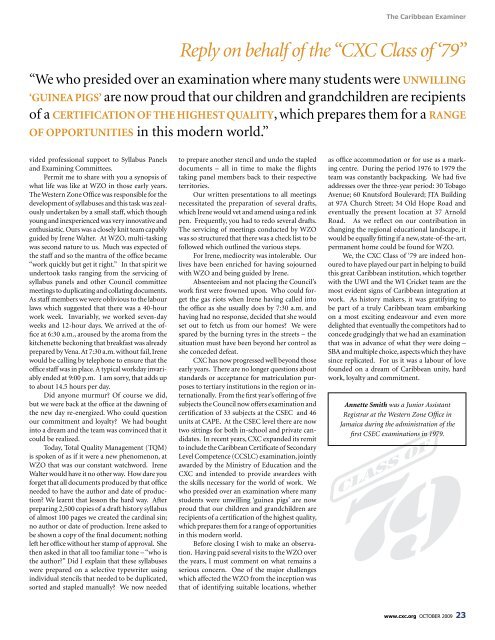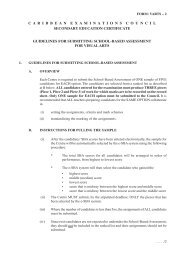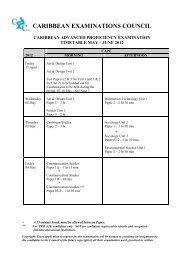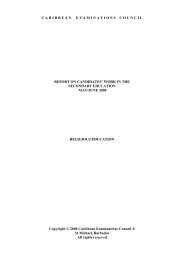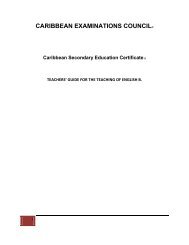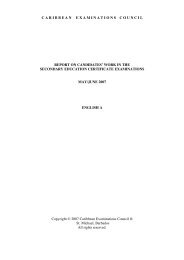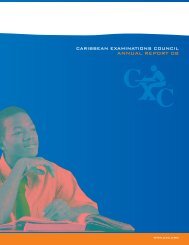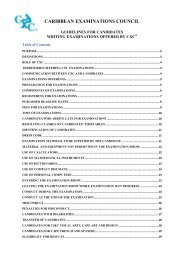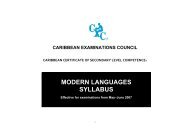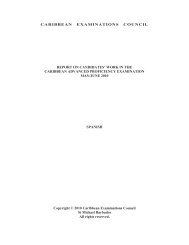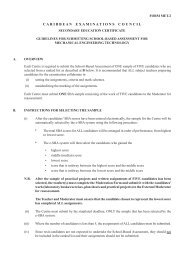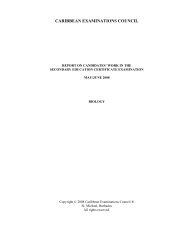Caribbean Examinations Council
Caribbean Examinations Council
Caribbean Examinations Council
You also want an ePaper? Increase the reach of your titles
YUMPU automatically turns print PDFs into web optimized ePapers that Google loves.
The <strong>Caribbean</strong> Examiner<br />
Reply on behalf of the “CXC Class of ‘79”<br />
“We who presided over an examination where many students were unwilling<br />
‘guinea pigs’ are now proud that our children and grandchildren are recipients<br />
of a certification of the highest quality, which prepares them for a range<br />
of opportunities in this modern world.”<br />
vided professional support to Syllabus Panels<br />
and Examining Committees.<br />
Permit me to share with you a synopsis of<br />
what life was like at WZO in those early years.<br />
The Western Zone Office was responsible for the<br />
development of syllabuses and this task was zealously<br />
undertaken by a small staff, which though<br />
young and inexperienced was very innovative and<br />
enthusiastic. Ours was a closely knit team capably<br />
guided by Irene Walter. At WZO, multi-tasking<br />
was second nature to us. Much was expected of<br />
the staff and so the mantra of the office became<br />
“work quickly but get it right.” In that spirit we<br />
undertook tasks ranging from the servicing of<br />
syllabus panels and other <strong>Council</strong> committee<br />
meetings to duplicating and collating documents.<br />
As staff members we were oblivious to the labour<br />
laws which suggested that there was a 40-hour<br />
work week. Invariably, we worked seven-day<br />
weeks and 12-hour days. We arrived at the office<br />
at 6:30 a.m., aroused by the aroma from the<br />
kitchenette beckoning that breakfast was already<br />
prepared by Vena. At 7:30 a.m. without fail, Irene<br />
would be calling by telephone to ensure that the<br />
office staff was in place. A typical workday invariably<br />
ended at 9:00 p.m. I am sorry, that adds up<br />
to about 14.5 hours per day.<br />
Did anyone murmur? Of course we did,<br />
but we were back at the office at the dawning of<br />
the new day re-energized. Who could question<br />
our commitment and loyalty? We had bought<br />
into a dream and the team was convinced that it<br />
could be realized.<br />
Today, Total Quality Management (TQM)<br />
is spoken of as if it were a new phenomenon, at<br />
WZO that was our constant watchword. Irene<br />
Walter would have it no other way. How dare you<br />
forget that all documents produced by that office<br />
needed to have the author and date of production?<br />
We learnt that lesson the hard way. After<br />
preparing 2,500 copies of a draft history syllabus<br />
of almost 100 pages we created the cardinal sin;<br />
no author or date of production. Irene asked to<br />
be shown a copy of the final document; nothing<br />
left her office without her stamp of approval. She<br />
then asked in that all too familiar tone – “who is<br />
the author?” Did I explain that these syllabuses<br />
were prepared on a selective typewriter using<br />
individual stencils that needed to be duplicated,<br />
sorted and stapled manually? We now needed<br />
to prepare another stencil and undo the stapled<br />
documents – all in time to make the flights<br />
taking panel members back to their respective<br />
territories.<br />
Our written presentations to all meetings<br />
necessitated the preparation of several drafts,<br />
which Irene would vet and amend using a red ink<br />
pen. Frequently, you had to redo several drafts.<br />
The servicing of meetings conducted by WZO<br />
was so structured that there was a check list to be<br />
followed which outlined the various steps.<br />
For Irene, mediocrity was intolerable. Our<br />
lives have been enriched for having sojourned<br />
with WZO and being guided by Irene.<br />
Absenteeism and not placing the <strong>Council</strong>’s<br />
work first were frowned upon. Who could forget<br />
the gas riots when Irene having called into<br />
the office as she usually does by 7:30 a.m. and<br />
having had no response, decided that she would<br />
set out to fetch us from our homes? We were<br />
spared by the burning tyres in the streets – the<br />
situation must have been beyond her control as<br />
she conceded defeat.<br />
CXC has now progressed well beyond those<br />
early years. There are no longer questions about<br />
standards or acceptance for matriculation purposes<br />
to tertiary institutions in the region or internationally.<br />
From the first year’s offering of five<br />
subjects the <strong>Council</strong> now offers examination and<br />
certification of 33 subjects at the CSEC and 46<br />
units at CAPE. At the CSEC level there are now<br />
two sittings for both in-school and private candidates.<br />
In recent years, CXC expanded its remit<br />
to include the <strong>Caribbean</strong> Certificate of Secondary<br />
Level Competence (CCSLC) examination, jointly<br />
awarded by the Ministry of Education and the<br />
CXC and intended to provide awardees with<br />
the skills necessary for the world of work. We<br />
who presided over an examination where many<br />
students were unwilling ‘guinea pigs’ are now<br />
proud that our children and grandchildren are<br />
recipients of a certification of the highest quality,<br />
which prepares them for a range of opportunities<br />
in this modern world.<br />
Before closing I wish to make an observation.<br />
Having paid several visits to the WZO over<br />
the years, I must comment on what remains a<br />
serious concern. One of the major challenges<br />
which affected the WZO from the inception was<br />
that of identifying suitable locations, whether<br />
as office accommodation or for use as a marking<br />
centre. During the period 1976 to 1979 the<br />
team was constantly backpacking. We had five<br />
addresses over the three-year period: 30 Tobago<br />
Avenue; 60 Knutsford Boulevard; JTA Building<br />
at 97A Church Street; 34 Old Hope Road and<br />
eventually the present location at 37 Arnold<br />
Road. As we reflect on our contribution in<br />
changing the regional educational landscape, it<br />
would be equally fitting if a new, state-of-the-art,<br />
permanent home could be found for WZO.<br />
We, the CXC Class of ‘79 are indeed honoured<br />
to have played our part in helping to build<br />
this great <strong>Caribbean</strong> institution, which together<br />
with the UWI and the WI Cricket team are the<br />
most evident signs of <strong>Caribbean</strong> integration at<br />
work. As history makers, it was gratifying to<br />
be part of a truly <strong>Caribbean</strong> team embarking<br />
on a most exciting endeavour and even more<br />
delighted that eventually the competitors had to<br />
concede grudgingly that we had an examination<br />
that was in advance of what they were doing –<br />
SBA and multiple choice, aspects which they have<br />
since replicated. For us it was a labour of love<br />
founded on a dream of <strong>Caribbean</strong> unity, hard<br />
work, loyalty and commitment.<br />
Annette Smith was a Junior Assistant<br />
Registrar at the Western Zone Office in<br />
Jamaica during the administration of the<br />
first CSEC examinations in 1979.<br />
www.cxc.org OCTOBER 2009 23


